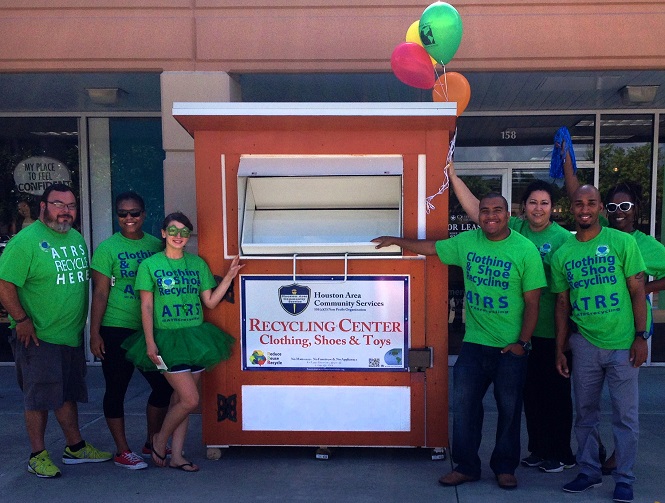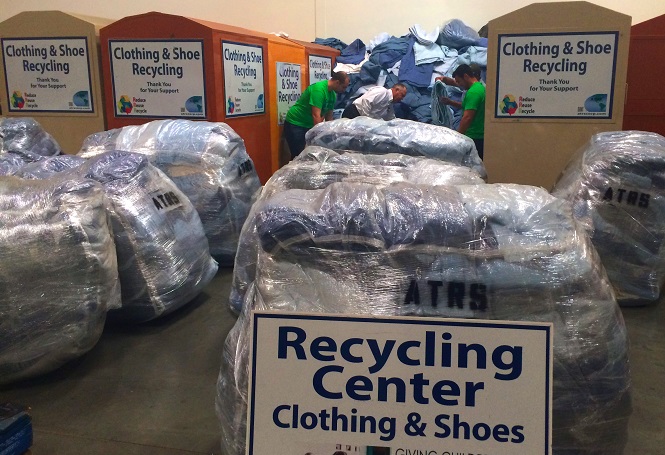 American Textile Recycling Service (ATRS) advertises itself as “Your Neighborhood Recycler,” but it’s so much more. ATRS tackles the circular economy at all levels. It provides neighborhood recycling drop-off sites, hosts a series of recycling events throughout the year, partners with tons of non-profits to help them recycle and collect funds from the recycling efforts, redistributes recyclables into the industries that need the materials most and offers recycling programs to cities and businesses alike.
Debra Stevenson-Peganyee, chief marketing officer for ATRS, explained the benefits of the company, “American Textile Recycling Service provides easy, convenient textile recycling solutions to help cities nationwide stay clean and green. Our commitment to philanthropy is just as important as our passion for the environment… Every pound of unwanted clothing, shoes & household textiles donated into one of our signature orange recyclers does so much good in your community, across the country and throughout the world!”
American Textile Recycling Service (ATRS) advertises itself as “Your Neighborhood Recycler,” but it’s so much more. ATRS tackles the circular economy at all levels. It provides neighborhood recycling drop-off sites, hosts a series of recycling events throughout the year, partners with tons of non-profits to help them recycle and collect funds from the recycling efforts, redistributes recyclables into the industries that need the materials most and offers recycling programs to cities and businesses alike.
Debra Stevenson-Peganyee, chief marketing officer for ATRS, explained the benefits of the company, “American Textile Recycling Service provides easy, convenient textile recycling solutions to help cities nationwide stay clean and green. Our commitment to philanthropy is just as important as our passion for the environment… Every pound of unwanted clothing, shoes & household textiles donated into one of our signature orange recyclers does so much good in your community, across the country and throughout the world!”
A company focused on the local and global community
A current example of ATRS’s community programs is the Shop&Recycle campaign that runs through August. The program focuses on public education to help people remember to donate their old clothes, dorm bedding, sports gear, shoes and textiles while they replace these items at back-to-school sales. Drop-off sites are conveniently located at malls, shopping centers and retailers. The event page states, “Shop tax-free weekends while doing something good for others, and leave a greener footprint with those fabulous new shoes. Check out these Shop&Recycle verified locations for Back2School Weekends. Look for distinctive ATRS Recyclers with the globe logo and recycling symbol and responsibly recycle your old clothes. Every item collected directly benefits a local charity and supports local programs and services in our communities.” You can find out more about the event via Facebook, Twitter and Instagram with #ShopNRecycle or at atrscorp.com/shopnrecycle. ATRS even partnered with a local university and business this past May to help support the Nepal disaster relief after a 7.8 magnitude earthquake devastated the area. While picking up a load of surplus blankets from Loyola Marymount, a university in Southern California, a market team manager for ATRS got the idea to donate the blankets to Nepal. ATRS then worked with Giving Children Hope (GCH), a nonprofit devoted to serving children and families worldwide, to get the blankets to residents of Nepal affected by the earthquake.
Sean Lawrence, executive director of GCH, said, “These blankets will be an incredible blessing to those we are serving in Nepal. They will provide warmth for years to come to those who have lost their housing.”
ATRS also prides itself on helping local communities. The textiles themselves are used wherever they are needed. ATRS gives first pick to local charities for whatever they need, such as bedding, office supplies, textiles, household goods and perishables.
ATRS is partnered with a host of nonprofits throughout the country. The Katy YMCA in Houston, Michigan Humane Society, Children’s Miracle Network Hospitals Austin and MADD Oklahoma are just a few examples. ATRS assists nonprofits in producing funding through recycling by working closely with these organizations to host recycling programs. ATRS pays its nonprofit partners the fair market value of donated goods in the form of monthly checks, which support their community programs and services. As ATRS puts it, funding goes to charities that are desperately in need of it, recycled goods go to where they’re needed and families across the country can clean out their cluttered homes. ATRS has provided $4.6 million to charities across the nation.
ATRS even partnered with a local university and business this past May to help support the Nepal disaster relief after a 7.8 magnitude earthquake devastated the area. While picking up a load of surplus blankets from Loyola Marymount, a university in Southern California, a market team manager for ATRS got the idea to donate the blankets to Nepal. ATRS then worked with Giving Children Hope (GCH), a nonprofit devoted to serving children and families worldwide, to get the blankets to residents of Nepal affected by the earthquake.
Sean Lawrence, executive director of GCH, said, “These blankets will be an incredible blessing to those we are serving in Nepal. They will provide warmth for years to come to those who have lost their housing.”
ATRS also prides itself on helping local communities. The textiles themselves are used wherever they are needed. ATRS gives first pick to local charities for whatever they need, such as bedding, office supplies, textiles, household goods and perishables.
ATRS is partnered with a host of nonprofits throughout the country. The Katy YMCA in Houston, Michigan Humane Society, Children’s Miracle Network Hospitals Austin and MADD Oklahoma are just a few examples. ATRS assists nonprofits in producing funding through recycling by working closely with these organizations to host recycling programs. ATRS pays its nonprofit partners the fair market value of donated goods in the form of monthly checks, which support their community programs and services. As ATRS puts it, funding goes to charities that are desperately in need of it, recycled goods go to where they’re needed and families across the country can clean out their cluttered homes. ATRS has provided $4.6 million to charities across the nation.
The circular economy in action
From an operations standpoint, ATRS’s process is pretty straightforward. ATRS has a complete list of what the company does and doesn’t accept for recycling at its drop-off locations or events here. What it accepts is pretty extensive. ATRS accepts all clothing, toys, shoes and household textiles, such as rugs. Reusable items are resold to local resale and thrift shops. Unusable items like torn jeans can be recycled into new items like wiping rags. It even accepts non-textiles like books, DVDs, bowls, figurines, etc. If it fits in the bin and won’t break, one of the bins can take it.
ATRS does not take large, bulky items like mattresses, furniture and appliances, or electronics, general trash and broken housewares. To find a recycler, you can call the 24-hour hotline to see if there is a bin close to you. ATRS is expanding rapidly all over the country.
As for where clothes go, ATRS lists that 45 percent is usable and goes to the secondhand market, 20 percent is used for upholstery and automotive stuffing, 30 percent is used for wiping rags and 3 percent goes to disaster relief. ATRS estimates that it has diverted 190 million pounds of textiles from landfills across the U.S.
ATRS is a for-profit company and does not take government support for what it does. Its services are free to the community. It reuses almost everything through grading and sorting all items that come in. Profits come from redistributing textiles. The net profit is pennies on the pound, so ATRS operates under conditions that require being as efficient and open to the community as possible.
From an organizational standpoint, all that a city, business or charity has to do is partner with ATRS. There is no cost to charities. ATRS then helps manage the recycling program, since it’s geared towards organizations that do not have the means or staff to run a program. ATRS says that a program takes 18-24 months to become profitable.
Keeping active with yearly events
One of the ways ATRS gets the word and support out to the community is through its annual events. In addition to the Back to School event listed above, there are:Earth Day: Every year ATRS hosts and sponsors recycling events all across the country during all of April.
College Move Out: As students move out of dorms from May to July, ATRS provides recycling bins on campuses.
America Recycles Day: This public awareness event around November 15, called Pledge2Recycle, helps communities engage their residents in recycling.
Rock N’ Roll Marathon: ATRS provides recycling sites at several of the marathon’s annual run stops.